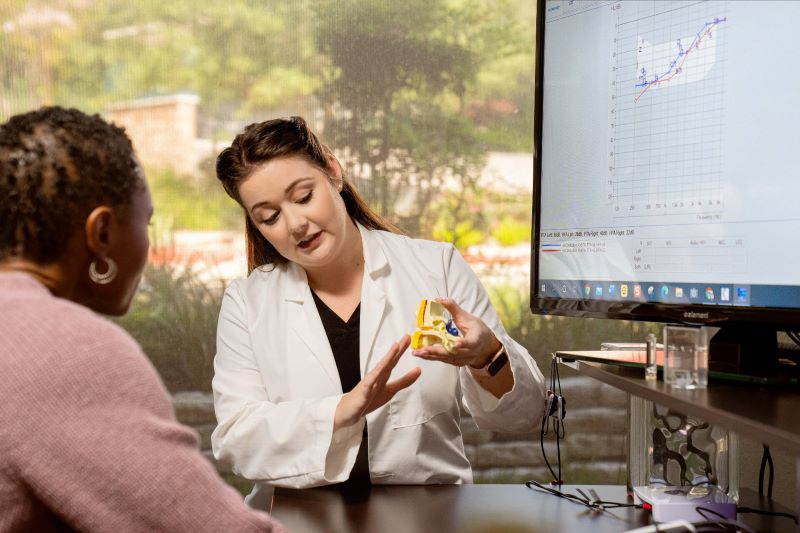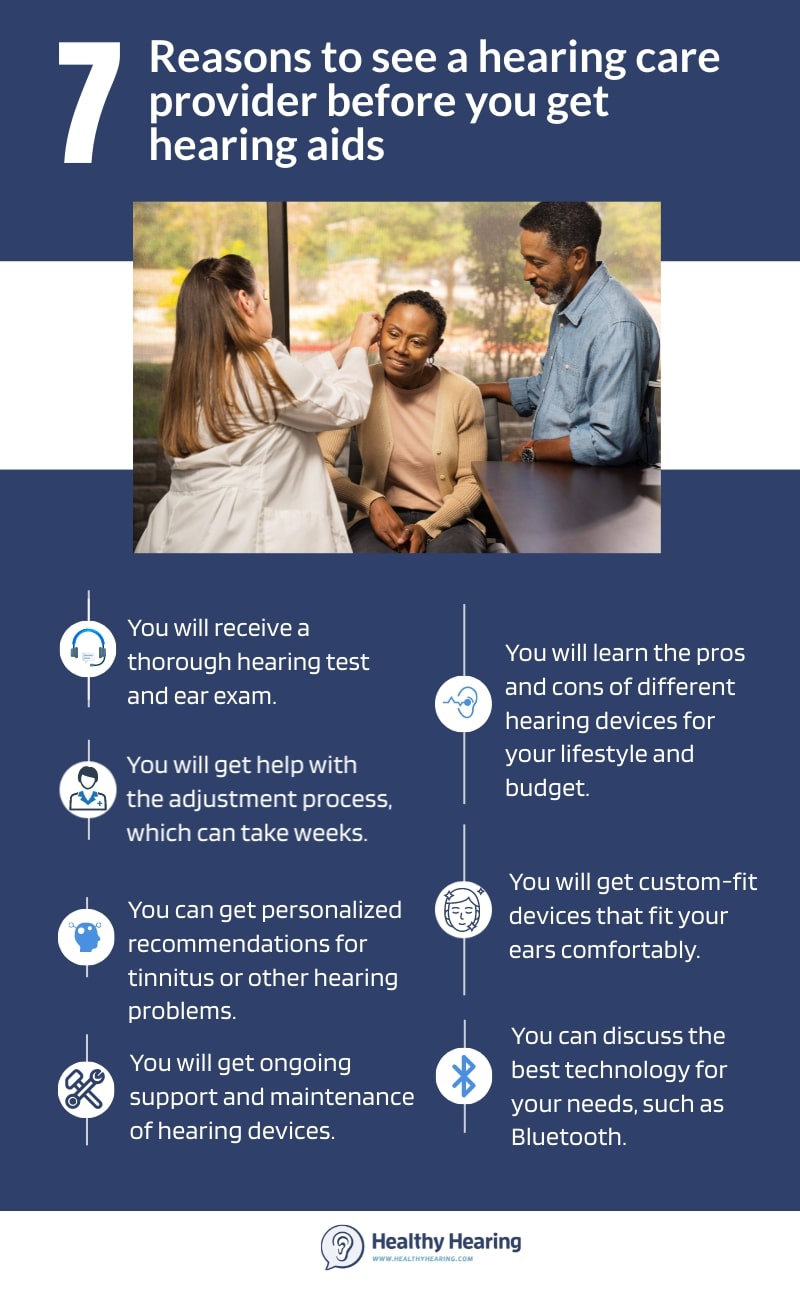|
www.HealthyHearing.com |
7 reasons to see an audiologist or hearing specialist before getting hearing aids
Contributed by Amy Sarow, AuD, clinical audiologist When it comes to your hearing health, there are many reasons why seeing a professional can be advantageous. Hearing care professionals—such as audiologists and hearing instrument specialists—are trained to help you understand your hearing loss and recommend the best treatment options for you. If you're thinking about purchasing hearing aids, either over the counter (OTC) or through a professional, here's why you should see an audiologist or hearing care professional first.
1. You'll receive a thorough hearing test and ear examIf you've been noticing that it's harder to hear than it used to be, it's time to see a hearing care professional. They will conduct a hearing test to determine the extent of your hearing loss, go over your results, answer questions, and make appropriate recommendations for you. These results are important information to have because it helps you make informed decisions about your hearing healthcare. An audiologist is also able to do special testing in the ear, called real-ear measurement (REM), which will ensure your hearing aids provide volume that is appropriate, comfortable, and safe for your hearing loss. REM is considered the gold standard when it comes to ensuring that your hearing technology provides the benefit that you need. Hearing loss is not a one-size-fits-all issue. A thorough hearing test can determine whether the hearing difficulty stems from the middle ear or inner ear, and if one ear hears significantly better than the other. For example, asymmetric hearing loss may include a medical referral to rule out other health conditions. 2. You'll learn pros and cons of different treatment optionsThere are a variety of treatment options available for hearing loss, from OTC hearing aids to cochlear implants. An audiologist can help you understand the pros and cons of each option and recommend the best one for you based on the severity of your hearing loss and your lifestyle. Along those lines, working with a hearing care professional means that you’ll get the best recommendations over the continuum of care. Hearing loss can change over time and a hearing care professional can help determine when other options are more appropriate for your hearing loss. Hearing aids come in many different styles, sizes and price points. Audiologists and hearing care professionals are well-trained and able to fit hearing aids to your specific hearing loss, lifestyle and budget. No two ears or hearing losses are the same, and a hearing care professional is the most qualified person to provide expert advice about the best options for your unique situation. Audiologists and hearing instrument specialists have extensive training and real-world experience with the latest hearing technology. 3. You'll get ongoing help adjusting to hearing aidsHearing aids require an adjustment process for several reasons. For many, hearing loss develops gradually over time. Especially for those with a gradual onset of hearing loss, the volume may need to be gradually increased over time as the ears adjust to the new sound. With appropriately fit hearing aids, the volume can seem too loud at first. Imagine sitting in a dark room and suddenly having the lights turned on. To continue with the analogy, sometimes it’s more comfortable to gradually bring up the lights, rather than to turn them all the way on. The same is true for new hearing aid users. A hearing care professional is trained to work with your comfort level to provide amplification that is appropriate for your hearing loss but also keeps your comfort in mind. In addition to adjusting to the sound quality and volume of new hearing aids, it can also take some time to feel comfortable putting the devices on and learning how to care for and maintain the devices. Questions are bound to come up, especially in the beginning. A hearing care professional is the perfect guide to support your hearing journey and assist you with questions, and challenges, or support you in other ways. 4. You'll get personalized care based on your lifestyleOne of the benefits of seeing an audiologist is that they can provide personalized care and often have doctoral degrees and can work collaboratively with ear, nose and throat physicians. They'll get to know you and your unique needs to provide the best possible care. This is in contrast to buying an OTC hearing aid, where you're essentially on your own when it comes to figuring out how to use and care for the device. If Bluetooth is important to you, your hearing care professional will show you how your hearing aids will work with your other Bluetooth devices. Or if you’d prefer to keep it simple, they can certainly accommodate this as well. Treating hearing loss is about more than just technology. It's about finding the right solution for your unique hearing needs so you can live your life to the fullest. An audiologist or hearing care professional will work with you to help your hearing technology best meet your needs. For example, if you struggle most with background noise, your audiologist can make programming adjustments, and specific custom programs, such as for music, or share useful tips and tricks to help. While putting hearing aids on can certainly help, sometimes there are other pieces involved in hearing difficulty that can play a role. For example, you may still struggle to understand speech even with the correct amplification. An audiologist can discuss your best options to help in these situations. 5. You'll get assistance with technologyYour hearing care professional can provide the best sizing and fit options for custom earmolds or other retention options to help keep your hearing device comfortably in place. They also help connect your hearing aids to smartphone apps and recommend other helpful devices, such as assistive listening devices. If you're considering getting an OTC hearing aid, keep in mind there may be less support available to you. While OTC devices are an option for those with mild to moderate hearing loss, there are people who should not get an OTC hearing aid. OTC hearing aids will not work well for those not comfortable with a Smartphone hearing aid app, with more than moderate hearing loss, an asymmetrical hearing loss, or for those preferring in-person care. When making decisions about your hearing healthcare, it’s important to consider all factors to make the best choice for your hearing, needs, and lifestyle. 
the unique nature of your hearing loss. 6. You'll get tinnitus supportTinnitus, or ear ringing, is a common symptom that accompanies hearing loss. For some, it can be quite bothersome. Hearing aids are one management strategy. However, hearing care professionals also have other tools that they can use to provide the best tinnitus management strategies and support. For example, your hearing aid specialist can customize specific programs on your hearing aid for tinnitus masking, adjust specific frequencies that contribute to your tinnitus perception or recommend other options for you. More: Will OTC hearing aids help with tinnitus? 7. You'll get follow-up care for hearing aidsHearing care professionals will set regular appointments for maintenance and follow-up care. These in-person appointments are a great opportunity to check in and see how you’re doing. Based on your input, your hearing care professional will continue to make any tweaks or adjustments to your settings to keep you hearing your best. Sometimes it’s these little fine-tuning adjustments that can make all the difference. Additionally, hearing care professionals will check and clean your devices at regular, consistent intervals. These regular appointments ensure that any pieces or parts of the device that need attention are cared for. For example, your hearing care professional will notice signs of corrosion in the battery compartment or point out when microphone covers need to be cleaned or replaced. Staying on top of your technology will preserve the life of your device, helping you to get the most out of your investment. Hearing healthcare is a journeyIt takes times to get used to hearing aids, and they need adjustments and cleaning from time to time. Working with a knowledgeable provider will give you the best possible experience. If you're considering purchasing a hearing aid, make sure to see an audiologist or hearing instrument specialist near you. They can help you understand your hearing loss, recommend the best treatment options, and provide personalized care. With so many benefits, it makes sense to plan on this first step in your hearing healthcare journey. Amy Sarow, AuD, clinical audiologist
Related Help Pages:
Causes Tests Hearing aids Bluetooth Fitting Cochlear implants Tinnitus (ringing in the ears)
|
Featured clinics near me
Earzlink Hearing Care - Reynoldsburg
7668 Slate Ridge Blvd
Reynoldsburg, OH 43068

Find a clinic
We have more hearing clinic reviews than any other site!



 Dr. Amy Sarow obtained her Doctor of Audiology at the University of Iowa and spent her 4th year residency at the Mayo Clinic School of Health Sciences in Jacksonville, Florida. Dr. Sarow currently serves as Audiology Lead for Soundly.com and is a Forbes Health Advisory Board member.
Dr. Amy Sarow obtained her Doctor of Audiology at the University of Iowa and spent her 4th year residency at the Mayo Clinic School of Health Sciences in Jacksonville, Florida. Dr. Sarow currently serves as Audiology Lead for Soundly.com and is a Forbes Health Advisory Board member.